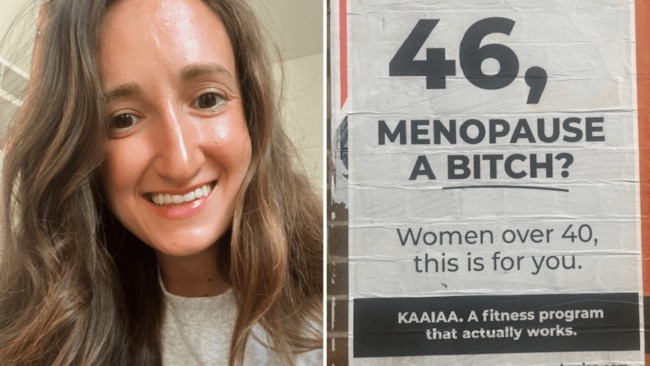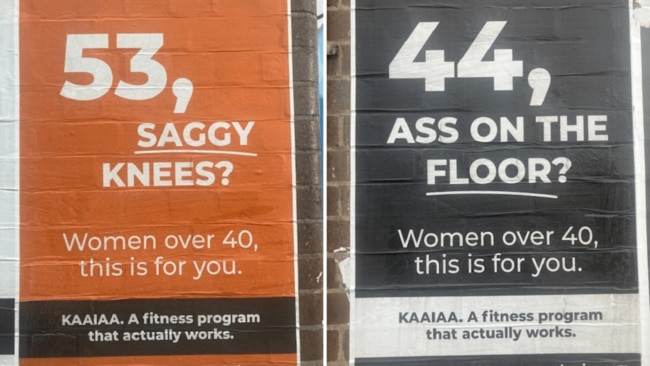'Mummy, what’s a B-I-T-C-H?' Fury at profane ads near children's park
EXCLUSIVE: "Another read: '44, ass on the floor?' Near a place where kids play? So inappropriate."
Parenting
Don't miss out on the headlines from Parenting. Followed categories will be added to My News.
This story was written for Kidspot by Megan.*
“Mummy, what’s a B-I-T-C-H?”
That’s what my young kids who are learning to read asked after seeing an ad on the way to the park that said, "46, menopause a bitch?"
It’s one of those parenting moments you’re never quite ready for — when the outside world enters your child’s understanding before you’ve had the chance to explain it. I was shocked and frankly a bit slow to respond.
When I did, all I could muster was “That’s a word some people use when they’re feeling really mad or trying to hurt someone’s feelings. It’s not a kind word, and we don’t use it."
The poster did not bother me because I’m easily offended, but because this kind of language on an ad for a local wellness business targeting women — near a place like Sydney's Centennial Park — felt completely inappropriate.
Want to join the family? Sign up to our Kidspot newsletter for more stories like this.
"44, ass on the floor?"
A slew of others posters from the same place were adorned roughly 50 meters from the park gates: “44, ass on the floor” and “53, saggy knees?”
Public spaces should be safe for all audiences, especially children. As a mum to young kids, I certainly don’t want my child’s literacy milestones to be built on what are, in my view, misogynistic catchphrases.
And after speaking with a few mum friends, they’ve seen them elsewhere in Sydney’s Eastern Suburbs while out with their kids, too.
As a mum and a marketing and advertising professional, I believe this speaks to a larger issue: the lack of sensitivity in some creative and approval processes, as well as how we think and talk about women’s bodies.
When campaigns like this make it to the street, it raises the question; was anyone in the room thinking about the very mums who are the target of these ads, their children, or the community context at all?
Because I found the campaign so concerning — both in tone and in placement — I decided to take action.

RELATED: I would laugh at parents who got ‘tacky’ professional photos of their kids
"Women over 40, this is for you"
I submitted a complaint to Ad Standards Australia, outlining my concerns about the ad’s language and public visibility, particularly given the posters' proximity to playgrounds, walking tracks, and other high-foot-traffic family spaces.
I also contacted the advertiser directly to express my concerns in writing. The business's founder responded with the following statement**:
“Dear Megan,
My name is Leah Simmons, I am the Founder of KAAIAA.
Thank you for taking the time to email us regarding our most recent poster campaign. Whilst I am not a Marketing and Advertising Professional, I am indeed a mother of 2 and also a woman. I have been in the health and wellness industry for almost 20 years and at 48 years old, what I find most offensive is the lack of services and spaces specifically designed for women to have an open and frank conversation about what 51% of the population is inevitably going to experience.
Our campaign was based around actual responses from the hundreds of women that I am in constant communication with every single day and represents the top 3 pain points that they experience moving into perimenopause and beyond. Our women-only studio has provided a sanctuary for them to finally talk about the things that they want to, and our program offers them a solution that is specifically tailored for them. It empowers them to not feel embarrassed or ashamed about highlighting what can be a confusing time and connects them with a community who are all after the same thing; taking control back of their own health and (for once) being unapologetic about it.
Granted, our campaign was designed to garner attention (because, well, marketing and advertising) and it is one of many that we have run. It wasn’t designed to offend or demean... rather it was a way for us to directly speak to a demographic of women who are silently thinking what we have simply stated, give them permission to acknowledge it, and offer them a solution.
The response to our campaign has been overwhelmingly positive, with many women actually signing up based upon our frank and honest messaging. I dare say, that it will be covered up in a week or so with another campaign but honestly, in 2025, if we can’t have a giggle at ourselves, then really, what do we have left?
I am overseas at the moment but back early next week. My number is [redacted] if you would like to call me directly to continue the conversation but at the very least, Megan, I would love to invite you to our beautiful studio to experience a class or two.
Our community is thriving and strong and I am beyond proud of every single one of them."

"As a mum, I know that words matter"
While I appreciate the importance of creating space for honest conversations about women’s health, I don't believe that empowering women requires shock-value language in public placement that disregards families and children.
The founder's response did not include apology for the use of profanity near public parks, nor did she address the impact that I believe such messaging can have on young children learning to read or exploring how our culture views aging women. Intent does not negate impact, and being a founder or a mother doesn’t absolve us from responsibility, especially when our work enters the public sphere.
Some might say it’s just a word — that people are too sensitive, or that we should brush it off. But as a mum, I know that words matter, especially the ones our children hear before they even understand them.
Kids are sponges. They're always listening, always learning — from us, from each other, and from the world around them. And when their first encounter with a word like “bitch” happens on a giant poster next to a place of play, not only is it jarring — it becomes part of their emotional vocabulary before they’re old enough to unpack what it really means.
What are we teaching them when the first time they see that word, it’s used to describe a uniquely woman’s experience? Or when “ass on the floor” becomes a headline for aging? These aren’t just phrases to me — they’re messages about worth, identity, and shame, delivered publicly.
We should help our kids—and ourselves—understand that aging isn’t something to fear or laugh at, that menopause isn’t a punchline, and that a woman’s body is not public property for commentary or critique but something powerful, worthy, and deeply human. And that profanity in advertising has no place near playgrounds.
When we reduce these experiences to jokes on a wall, we’re not just failing women — we’re failing the next generation who will grow up internalising those jokes (and language) as normal. I believe we deserve better. And so do our kids.
*Megan wants to protect her privacy
**This statement was confirmed by Kidspot and has been published here with permission
More Coverage
Originally published as 'Mummy, what’s a B-I-T-C-H?' Fury at profane ads near children's park





